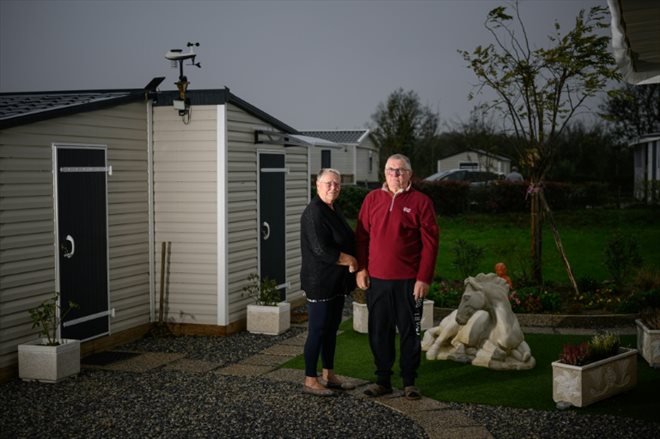Mégane Lévèque and her children in front of their mobile home at the La Grisse campsite, November 8, 2023 in Vendée (AFP/LOIC VENANCE)
At the La Grisse campsite, in Vendée, open all year round, there are the owners, those who have purchased a mobile home as low-budget accommodation synonymous with freedom or sociability. And then the tenants, those who are struggling to find housing or are recovering from a hard blow.
Mégane Lévèque, 31, and her three children, are among the latter. Waiting for social housing since her divorce, she lived with relatives for several months before renting a mobile home here, near the village of Givre.
To the north of the Poitevin marsh, the three-star campsite without swimming pool is surrounded by greenery. Nearly 80 mobile homes are installed there throughout the year.
“It’s not big but I’m regaining my independence. The children are warm, I have a few months of peace of mind. I’m breathing,” confides this home help, showing the three small rooms of her 38 square meters, rented for around 600 euros per month.
The young woman is currently receiving personalized housing assistance (APL) but will have to leave her mobile home before July and the arrival of vacationers, when its price will triple for the summer.
Sitting on a purple bench, one eye on her 4-year-old daughter who is preparing, scissors in hand, her letter to Santa Claus, she recounts the difficult months which followed her separation and the “endless” wait for social housing .
“At the beginning, I called every day. With three children, how do they expect me to wait calmly?” she sighs.
The number of households waiting for HLM has never been so high in France. At the end of 2022, there were 2.42 million, 162,000 more than in 2021, according to data from the Social Union for Housing (USH).
– neighbors –
Two mobile homes further on, a 21-year-old young woman recently moved in with her one-month-old baby. The father set sail so she came to live there “waiting to see”.
At the beginning of November, the owner of the campsite, Didier Martineau, explains that he has around fifty pending requests for his six mobile homes to rent.

Brigitte Bouché in front of her mobile home at the La Grisse campsite, November 8, 2023 in Vendée (AFP/LOIC VENANCE)
“We have a lot of calls from town halls or associations looking to accommodate homeless people but it is not at all suitable. The heart of our campsite is residential. People in search of meaning, who are looking for a quiet little place, a change of scenery”, explains the owner.
Brigitte Bouché, a lively 71-year-old retiree, arrived two and a half years ago from the Paris region, to be closer to her gendarme son and her grandchildren.
“I am better here than in the city. I have greenery, the sea, kind neighbors who took care of me when I had Covid. You quickly feel alone, at my age, in a building,” says the retiree, tea in hand on her sheltered terrace.
When the weather is nice, she and her neighbors often have an aperitif there.
– “security” –
On this “residential” side live retirees in search of sociability, workers attracted by the high employment rate in Vendée or for whom the mobile home, “easy to buy or resell”, is synonymous with freedom, and families facing a saturated real estate market.

Emilia and Christian Assié in front of their mobile home at the La Grisse campsite, November 8, 2023 in Vendée (AFP/LOIC VENANCE)
A second-hand mobile home can be purchased here from 30,000 euros. The campsite charges 2,000 euros per year to rent the land.
Emilia and Christian Assié, 78 and 74 years old, from Loire-Atlantique, sold a house a few years ago that they “could no longer maintain”.
To their 50 square meter mobile home, the couple added a closed and heated terrace, with kitchen and TV corner.
“Here everyone talks to each other, everyone knows each other. And then we feel safe. It’s not given to everyone, with everything we hear on the news,” says Emilia Assié.
Mégane Lévèque also evokes this “feeling of security” which allows her to let her children play freely in the aisles. She smiles: “Since we’ve been here, they say I shout less. Maybe there’s just enough space so they don’t hear me.”
© 2023 AFP
Did you like this article ? Share it with your friends using the buttons below.




